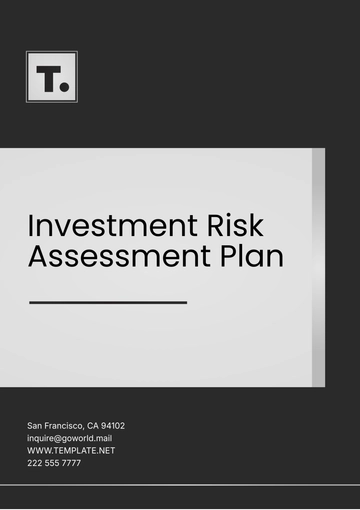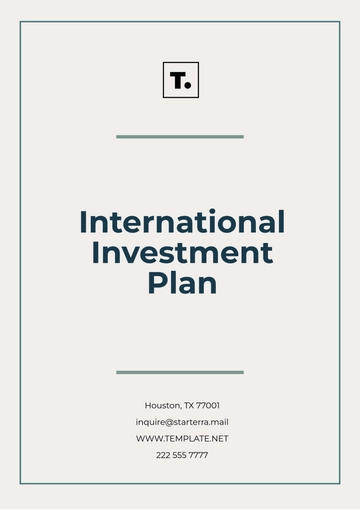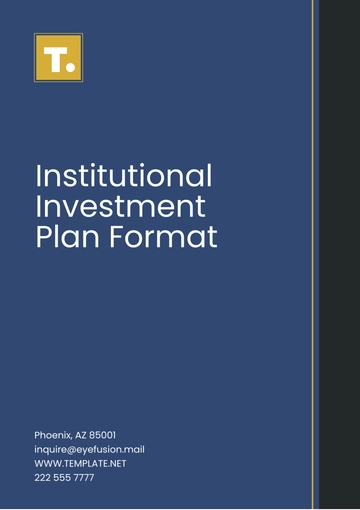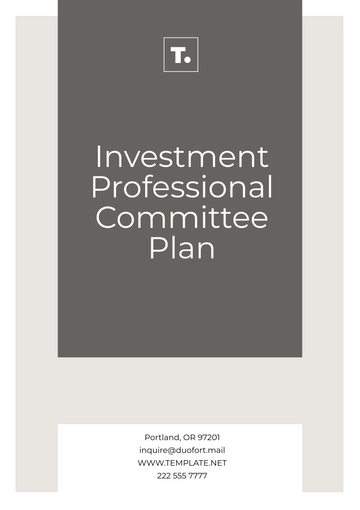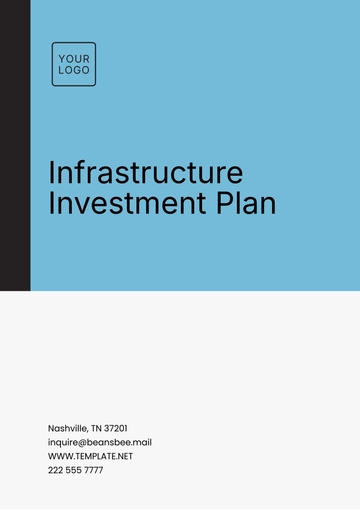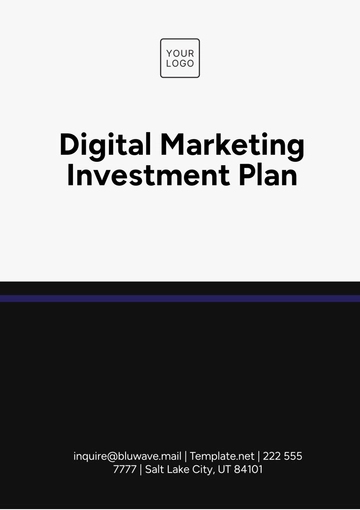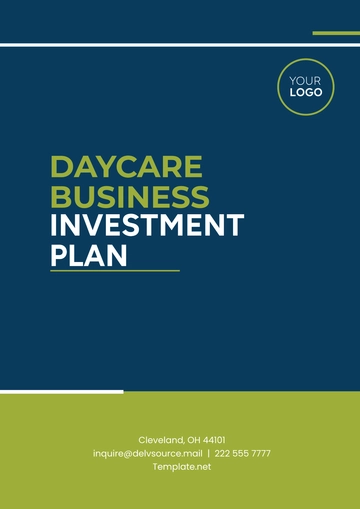Free Early-Stage Investment Plan

I. Executive Summary
The Early-Stage Investment Plan outlines a strategic framework for identifying, evaluating, and investing in startup companies. This document serves as a comprehensive guide for investors, ensuring that they make informed and strategic decisions throughout the investment process. Drawing from reliable data and credible sources, this plan aims to optimize investment outcomes and foster the growth of innovative startups.
II. Market Research and Analysis
Conducting thorough market research and analysis is essential for understanding the investment landscape and identifying potential opportunities.
1. Industry Trends
Key Trends: Identify and analyze pivotal trends within the industry to anticipate future market directions.
Emerging Technologies: Examine technologies poised for growth and their potential impact on market dynamics.
Regulatory Changes: Monitor legal and regulatory developments that may influence the operational environment of startups.
Market Size and Growth Potential: Evaluate current market size and projected growth rates to assess investment viability.
2. Competitive Landscape
Understanding the competitive environment is crucial for assessing a startup’s likelihood of success.
Competitor Identification: Identify key competitors within the market segment.
Competitive Analysis: Assess competitors’ strengths and weaknesses to determine the startup’s relative position.
3. Customer Needs and Insights
Understanding the target customer base is vital for validating market demand.
Customer Segmentation: Define the target audience and market segments.
Customer Feedback: Analyze customer feedback and insights to evaluate product-market fit.
III. Investment Criteria
Establishing clear investment criteria ensures that only startups with high potential are considered for funding.
1. Team Evaluation
Assessing the startup’s leadership team is critical for gauging potential success.
Founders’ Background: Review the experience and expertise of the founders.
Team Cohesion: Evaluate the dynamics and collaboration within the team.
2. Product and Technology
Evaluate the startup’s product or technology for its uniqueness and market applicability.
Innovation: Assess the uniqueness and innovative aspects of the product or service.
Intellectual Property: Review existing patents and IP protection strategies.
3. Financial Health
A thorough review of financial statements is necessary to understand the startup’s viability.
Revenue Streams: Identify and analyze diverse revenue channels.
Burn Rate and Runway: Evaluate the startup’s burn rate about its financial runway.
4. Market Traction
Understanding existing market traction provides insight into the startup’s acceptance.
Customer Acquisition: Analyze metrics related to customer acquisition and growth.
Partnerships and Alliances: Assess any existing partnerships that enhance market position.
IV. Due Diligence
Conducting rigorous due diligence ensures that the startup meets all investment criteria and helps identify potential risks.
1. Legal Due Diligence
Verify that all legal aspects are in order and that there are no outstanding legal issues.
Corporate Structure: Review the startup's corporate governance and organizational structure.
Contracts and Liabilities: Assess existing contracts, obligations, and liabilities.
2. Financial Due Diligence
Examine financial statements in detail to validate the startup’s financial standing.
Financial Statements: Review current and projected income statements, balance sheets, and cash flow statements.
Valuation Analysis: Conduct a valuation assessment to ensure the investment terms are reasonable.
V. Investment Execution
Executing the investment involves finalizing all terms and facilitating the funding process.
1. Term Sheet Negotiation
Negotiate the term sheet to reflect the agreed-upon investment terms.
Equity Stake: Define the equity stake and ownership structure.
Board Representation: Discuss and negotiate board representation rights.
2. Fund Transfer
Complete the transfer of funds per the agreed-upon terms.
Payment Milestones: Agree on payment milestones and conditions for fund disbursement.
Escrow Accounts: Set up escrow accounts if necessary to manage funds securely.
VI. Post-Investment Management
Effective post-investment management ensures that the startup remains on track to meet its objectives.
1. Performance Monitoring
Regularly monitor the startup’s performance and operational progress.
Reporting Framework: Establish a framework for quarterly reports and operational reviews.
Management Meetings: Schedule regular meetings with the management team to discuss progress and challenges.
2. Exit Strategy
Planning for a potential exit is crucial for realizing returns on investment.
Exit Opportunities: Identify potential buyers or partners for a strategic exit.
IPO Readiness: Prepare the startup for an Initial Public Offering (IPO) if applicable.
3. Value-Added Support
Offer ongoing support to enhance the startup’s growth trajectory.
Mentorship: Provide mentorship and strategic guidance to the startup’s leadership team.
Network Access: Leverage investor networks to facilitate partnerships and growth opportunities.
VII. Risk Management
Identifying and mitigating risks is vital to protecting investment interests.
Risk Assessment: Regularly conduct risk assessments to identify potential challenges.
Mitigation Strategies: Develop strategies to mitigate identified risks effectively.
VIII. Conclusion
The Early-Stage Investment Plan provides a structured and comprehensive approach to identifying and investing in promising startups. By adhering to this plan, investors can make informed decisions, recognize potential risks early, and ultimately achieve successful investment outcomes. This strategic framework fosters a collaborative environment, enabling startups to thrive while maximizing returns for investors.
- 100% Customizable, free editor
- Access 1 Million+ Templates, photo’s & graphics
- Download or share as a template
- Click and replace photos, graphics, text, backgrounds
- Resize, crop, AI write & more
- Access advanced editor
You may also like
- Finance Plan
- Construction Plan
- Sales Plan
- Development Plan
- Career Plan
- Budget Plan
- HR Plan
- Education Plan
- Transition Plan
- Work Plan
- Training Plan
- Communication Plan
- Operation Plan
- Health And Safety Plan
- Strategy Plan
- Professional Development Plan
- Advertising Plan
- Risk Management Plan
- Restaurant Plan
- School Plan
- Nursing Home Patient Care Plan
- Nursing Care Plan
- Plan Event
- Startup Plan
- Social Media Plan
- Staffing Plan
- Annual Plan
- Content Plan
- Payment Plan
- Implementation Plan
- Hotel Plan
- Workout Plan
- Accounting Plan
- Campaign Plan
- Essay Plan
- 30 60 90 Day Plan
- Research Plan
- Recruitment Plan
- 90 Day Plan
- Quarterly Plan
- Emergency Plan
- 5 Year Plan
- Gym Plan
- Personal Plan
- IT and Software Plan
- Treatment Plan
- Real Estate Plan
- Law Firm Plan
- Healthcare Plan
- Improvement Plan
- Media Plan
- 5 Year Business Plan
- Learning Plan
- Marketing Campaign Plan
- Travel Agency Plan
- Cleaning Services Plan
- Interior Design Plan
- Performance Plan
- PR Plan
- Birth Plan
- Life Plan
- SEO Plan
- Disaster Recovery Plan
- Continuity Plan
- Launch Plan
- Legal Plan
- Behavior Plan
- Performance Improvement Plan
- Salon Plan
- Security Plan
- Security Management Plan
- Employee Development Plan
- Quality Plan
- Service Improvement Plan
- Growth Plan
- Incident Response Plan
- Basketball Plan
- Emergency Action Plan
- Product Launch Plan
- Spa Plan
- Employee Training Plan
- Data Analysis Plan
- Employee Action Plan
- Territory Plan
- Audit Plan
- Classroom Plan
- Activity Plan
- Parenting Plan
- Care Plan
- Project Execution Plan
- Exercise Plan
- Internship Plan
- Software Development Plan
- Continuous Improvement Plan
- Leave Plan
- 90 Day Sales Plan
- Advertising Agency Plan
- Employee Transition Plan
- Smart Action Plan
- Workplace Safety Plan
- Behavior Change Plan
- Contingency Plan
- Continuity of Operations Plan
- Health Plan
- Quality Control Plan
- Self Plan
- Sports Development Plan
- Change Management Plan
- Ecommerce Plan
- Personal Financial Plan
- Process Improvement Plan
- 30-60-90 Day Sales Plan
- Crisis Management Plan
- Engagement Plan
- Execution Plan
- Pandemic Plan
- Quality Assurance Plan
- Service Continuity Plan
- Agile Project Plan
- Fundraising Plan
- Job Transition Plan
- Asset Maintenance Plan
- Maintenance Plan
- Software Test Plan
- Staff Training and Development Plan
- 3 Year Plan
- Brand Activation Plan
- Release Plan
- Resource Plan
- Risk Mitigation Plan
- Teacher Plan
- 30 60 90 Day Plan for New Manager
- Food Safety Plan
- Food Truck Plan
- Hiring Plan
- Quality Management Plan
- Wellness Plan
- Behavior Intervention Plan
- Bonus Plan
- Investment Plan
- Maternity Leave Plan
- Pandemic Response Plan
- Succession Planning
- Coaching Plan
- Configuration Management Plan
- Remote Work Plan
- Self Care Plan
- Teaching Plan
- 100-Day Plan
- HACCP Plan
- Student Plan
- Sustainability Plan
- 30 60 90 Day Plan for Interview
- Access Plan
- Site Specific Safety Plan

